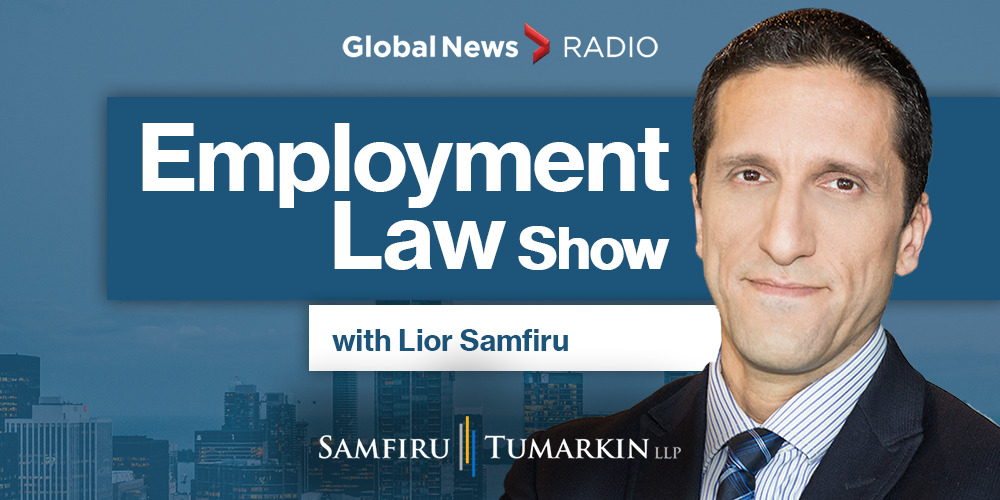Employment Law Show 640 Toronto – S10 E16

Episode Summary
What’s included in a severance package and how it’s calculated, let go when returning from a disability leave, suspended for not getting vaccinated, and more on Season 10 Episode 16 of the Employment Law Show on Global News Radio 640 Toronto.
Listen below as Employment Lawyer Lior Samfiru, Partner at Samfiru Tumarkin LLP, reveals your workplace rights in Toronto, the GTA, Hamilton, London, and across Ontario on the Employment Law Show. Lior shatters myths and misconceptions about severance pay, terminations, workplace harassment, overtime pay, wrongful dismissal, constructive dismissal, duty to accommodate, independent contractors, and more.
Listen to the Episode
Episode Notes
If the government of Ontario ends vaccine passports, will employees who were suspended for not being vaccinated be brought back to work?
Just because the province is ending the vaccine passport system, that does not necessarily mean that much, because an employer can ultimately decide what policies they want to have in their workplace. Regardless of what the government of Ontario is doing with vaccine passports, an employer does not necessarily have the right to let you go for cause or to put you off on a leave of absence if you’re not vaccinated. Either way, if you are let go, your employer owes you severance.
LEARN MORE
• Vaccine passports in Ontario: The facts
• Proof of Vaccination in British Columbia: The Facts
• Alberta COVID Restrictions: What You Need to Know
I was temporarily laid off because of the pandemic. My previous employer said that because I found another job they considered me to have resigned. Am I entitled to severance?
This is not a resignation. When they put you on a temporary layoff months ago, that was a termination of employment. Your employer did not have a right to put you on a temporary layoff when they did, which means they owed you severance. Anything you did after the fact can’t be a resignation because you were already let go. This is a reminder that if you’ve been put on a layoff, even if it’s because of the pandemic, it’s not something your employer is allowed to do, and you’re owed severance.
Do think vaccine mandates by employers will be lifted any time soon?
At some point, vaccine mandates will be not widely used, and employers will eventually find them unnecessary or undesirable, and that could be soon. We’re already seeing some employers changing their minds on those vaccine mandates. We’re certainly seeing governments rolling back vaccine passports. Keep in mind that for non-union employees, if someone has been put on a leave of absence, that’s not necessarily legal, and the employee can treat that as a termination and get severance.
A coworker of mine chose not to get vaccinated and refused daily testing at work and was told to stay home. Can our employer let him go for that?
Your employer can let him go at any time and for any reason, but they have to pay him severance. In fact, he’s already owed severance. If they’ve stopped giving him work, and if they told him to stay home, essentially they’ve suspended him. Right now, your friend has two options. The first option is that he can wait it out and see if they call him back. Option number two is that he can treat the suspension as a termination of employment and require them to pay him severance.
When can an employee take their employer to court for severance?
If you’re owed more severance than what you’ve been offered, then you have a case. For example, if your employer offers you two months’ severance and you’re owed more than two months, then you have a case. If you’re not owed more than that, you wouldn’t have a case. The vast majority of people when they’re let go are offered a lot less than what they’re actually owed either because the employer doesn’t know better, or the employer hopes to get away with it. As a result, most of those people are able to pursue it. In the vast majority of these cases, we can resolve it well before we even see the court, and we can resolve it with the company very quickly because the law is clear on severance.
If your employment agreement says that you’re only going to get paid a certain amount, and you have to work extra hours to complete that work, do you really deserve overtime pay?
The answer is that you have to get paid overtime. Your employer does not get to contract out of the overtime rules. It’s not possible if you work more than 44 hours in Ontario, because after 44 hours have been worked you have to get time-and-a-half. This is assuming you’re not in a position that’s exempt from overtime. For example, managers are exempt from overtime. Doctors, lawyers, accountants, and a few other positions like that are also exempt from overtime. But if you’re not in an exempt position, your employer has to pay even if you’re on a salary. The way you would calculate it is: whatever you earn in a week, divide that by 44, and that gets you an hourly rate, and time and a half is your overtime rate. So if you work 47 hours a week you have to get three extra hours paid at a time-and-a-half.
I’ve been on a disability leave for a year, and I’ve just been cleared to return to work, but my employer says that they don’t have a job for me. What can I do?
The first question is: do they have a job for you and are they just choosing not to give it to you? Because if that’s the case then it’s a human rights violation. If your employer doesn’t want to bring you back from a disability leave because you took a disability leave, that’s a human rights violation. But even if it is legitimate and there isn’t a position for you, let’s give the employer the benefit of the doubt, and they actually don’t have a job for you, they can’t just put you off. If they don’t have a job for you, that’s a termination, and they have to pay you severance. They’re not allowed to ask you to ‘check-in’ in a few months. You can wait if you want, but you can also treat it as a termination of your employment now and get severance.
Severance Packages: What’s included, and how is it calculated?
#1) What additional factors go into determining severance pay?
Anything that could impact your ability to find another job is a relevant factor for severance. For example, if you’re working in an industry where there’s not a lot of jobs, well, that’s going to increase your severance. If you’re looking for work in a bad economy where there are not a lot of jobs, that’s going to impact your severance. If you’re let go and your sick or you have a medical condition, that’s going to make it harder to find another job, so that’s going to impact your severance as well. Other factors that can increase your severance could include whether you were recruited from another job. There are many more factors that go into assessing that amount, and that’s why you really need to get some advice if and when you lose your job.
#2) What components of your compensation are included in severance?
Your severance package has to include all the components of your compensation for the period of time included as part of your severance. For example, if the severance period is 18 months, ask yourself: would I have received that part of my compensation during that 18-month period had I continued working? If the answer is yes, then it has to be included as part of your severance.
Because of that, severance includes your bonus, your average bonus, and your benefits. Your pension contributions have to be continued, and if you have a car allowance, that has to be continued. If you have stock options, those have to be allowed to vest.
#3) How is severance calculated if your compensation varies year to year?
If your salary varies from year to year, for example, if you are in a sales role and get paid based on your commission, we look at an employees’ compensation as a year two- or three-year average, and use that to calculate your compensation.
LEARN MORE
Severance for Salespeople
#4) How is severance calculated if an employee used to be full-time but is now part-time?
When calculating severance, what matters is your terms of employment at the time that you’re terminated. For example, if you’re full-time and you get moved to part-time and then ultimately you’re let go, your severance would be calculated based on your part-time salary. That’s why when it comes to changing your compensation, you really want to consider saying no, that’s a constructive dismissal, and treat that as a termination and get your severance before your salary changes. Don’t just accept reductions in pay, or really any changes, to the terms of your employment.
#5) If your bonus is discretionary, is it included as part of your severance package?
Companies always say that bonuses are discretionary, but it really isn’t discretionary if you get them every year. At that point, it becomes a part of your compensation and a term of your employment. If you get a bonus every year, the company has to include it as part of your severance pay.
LEARN MORE
• Bonuses and Severance Pay
• Are you still entitled to your bonus after termination?
#6) What if an employee usually works a lot of overtime hours?
Overtime pay is also included as part of your severance. When we look at your total compensation, if that’s a regular and consistent component of your compensation, that has to be included as part of your severance.
#7) How are stock options dealt with?
If you have stock options, that means that, for the severance period, whatever would have happened to your stock options if you’d continued working has to happen. For example, if they would have vested then they have to allow to be allowed to vest. If you would have received new stock options during the severance period based on the terms of your employment, then you have to receive them. You don’t just lose your stock options because the company lets you go.
#8) What about other perks that an employee may have, like an apartment or gym membership?
Apartments are included as a part of your compensation. So, if you’re being let go, your employer either has to allow you to stay in the apartment for the severance period or pay you an additional amount of money that you can use to rent an apartment. If your apartment is $2,000 a month and your severance period is 10 months, then they have to give you another $20,000 on account of the apartment. The same rules apply to gym memberships and any other perk that you would have received.
#9) What things do not get included in severance?
Things such as on-site parking, or a 407 transponder (if you take the 407 to get to work), are not going to be included. Employee discounts are not included. However, in most cases, everything else that is a perk of the job is included.




